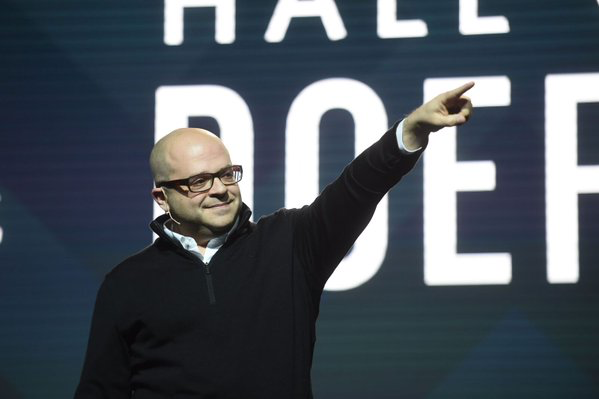Twilio: The tech unicorn you may use every day but have never heard of
CEO Jeff Lawson explains why Twilio went public and why research and development are key.

The casual observer might well expect to see Jeff Lawson at the Alexandra Palace in London in December. After all, Twilio's founder shares some physical features with darts maestro and two-time champion of the world Michael Van Gerwen.
Unlike the Dutchman's, Lawson's ability with tungsten remains an unknown quantity, but his entrepreneurial wisdom is more than evident.
Almost a decade since he launched Twilio, the cloud communications platform now boasts over one million users and its technology is used by some of the biggest brands in the world including eBay, Walmart and Coca-Cola. The company allows software developers to programmatically make and receive phone calls as well as send and receive text messages using its web service interface.
In a nutshell, Twilio is the communications engine that powers WhatsApp, Slack and the communication functions on Uber and AirBnB. For example, when a passenger and an Uber driver call each other, they do so via a Twilio number, which ensures both phone numbers are kept private. WhatsApp, on the other hand, uses Twilio to verify customer accounts and logins, while AirBnB connects landlords and guests through it.
However, while the company is now a success story in the world of start-ups, the first steps were anything but easy.
"Today, the platform model has proven to be extremely powerful but initially, it was not a model that everyone trusted. We received a lot of scepticism initially that it was too risky," Lawson tells IBTimes UK.
"But we knew that a low barrier of entry was what developers needed to get started and we trusted that as our customers grew and increased their usage of Twilio, our revenue would grow."
Grow it has and, in June last year, the San Francisco-headquartered company raised $150m (£120m) at a $1.2bn valuation and made its debut on the New York Stock Exchange. In the first day of trading, shares surged over 90%. Within two months they had doubled in value again.

However,things could have gone a lot differently. The company's initial public offering (IPO) was scheduled for 23 June, the day Britain voted in favour of leaving the European Union, rattling global markets in the process.
While the company did not expect that the outcome of the Brexit referendum would have a significant impact on its stock exchange debut, it still decided to anticipate its IPO by a day.
The decision of going public was in itself surprising, given a number of tech startups have recently opted to remain private. Uber has delayed its plan of floating, while in June last year Airbnb unveiled plans for a double stock sale to postpone its IPO.
Twilio's stock has fallen by 23% over the quarter and by 27% over the last six months, but despite the recent slump Lawson, who spent 15 months at Amazon as a developer in the mid-2000s, is confident it has gone down the right route.
"We have always believed that companies with solid fundamentals – great products, fiscally responsible, customer-focused, dedicated employees – will be successful in any environment," he says.
"In business there are always elements outside of your control but at we believe that if you focus on the things you can control, and invest time and resources accordingly, then opportunity will follow."
Over 12 months, Twilio's 30,000 customers power 75 billion connections across 1 billion of devices and Lawson admits keeping pace in a constantly changing environment such as that of communications, is a difficult task.
"Since our launch we have remained focused on building a company that could fulfil on our mission of fuelling the future of communications by empowering developers," he explains.
"Accomplishing this, at scale, for all the world's communication workloads is no easy feat.
"We've made international expansion a priority because communication is a global challenge and our platform needs to be able to reach every phone on the planet."
Lawson adds that the company, whose workforce is deliberately structured in small, autonomous teams to ensure customers' needs can be swiftly met, will continue to add the features and functionality needed to make it easier for developers to adopt its technology across a wide spectrum of industries.
"As traditional enterprises are investing in software and software developers, those developers are pulling Twilio into their enterprise," he explains.
The company, which is still to turn a profit, does not charge upfront fees, but operates on a pay-as-you-go pricing system, which means that programmers often use it to test an idea or product.
Again, Lawson is eager to point out that a low entry-barrier is crucial: "Because experimentation is the prerequisite to innovation, we've relentlessly focused on enabling developers to build and experiment on Twilio's platform with as little friction as possible," he says.
That, however, carries with itself the ever-increasing need to remain a step ahead when it comes to cyber security threats. The company, Lawson explains, has expanded its research and development team, which accounts for 50% of total workforce, to ensure it remains ahead of the curve.
"At Twilio we always say that job number one is operations and security. Job number two is everything else," says Lawson.
"And that's because customers are relying on us and trusting us to power their businesses."
© Copyright IBTimes 2025. All rights reserved.






















